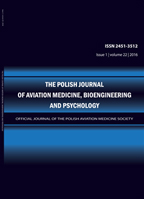2016, Volume 22, Issue 4
COPING STYLES OF STRESS AND THE LEVEL OF SOCIAL COMPETENCE OF THE STAFF MEMBERS INVOLVED IN THE HANDLING OF PASSENGERS ON LOT POLISH AIRLINES’ FLIGHTS
Jan F. TERELAK1, Katarzyna MAKUCH2
-------------------------------------------------------------------------------------------------
1Department of Aviation Psychology, Military Institute of Aviation Medicine
2Institute of Psychology, Cardinal Stefan Wyszynski University
Autor korenspondencyjny: Jan F. TERELAK; Department of Aviation Psychology, Military Institute of Aviation Medicine; email: jterelak@wiml.waw.pl
Full text
Streszczenie
Introduction: Both in the literature of the subject and in everyday life there is an interest in the relation between social competences and the ability to cope with the demands of life, especially with stressful situations. The aim of the study was to determine the relationship between coping styles of stress in the perspective of N.S.Endler and J.D.A. Parker with social competences according to the concept of A. Matczak.
Methods: To evaluate social competences defi ned as acquired skills of coping with social contacts, Anna Matczak’s Questionnaire of Social Competences was used to diagnose the eff ectiveness of functioning in specifi c situations requiring social interaction. Coping styles of stress were studied using Coping Inventory for Stressful Situations of N.A. Endler and J.D.A. Parker, designed to evaluate coping styles of stress in the sense of R. Lazarus’ interactive stress model.
Results: The statistically signifi cant diff erences in the scope of individual social competences were obtained among people who prefer diff erent coping styles of stress. It was found, among other things, that people with a style focused on emotions are characterized by lower eff ectiveness of social competences, manifested mainly in interpersonal relations requiring assertive behaviour, and that people who prefer the avoiding style of coping with stress are more susceptible to searching for social contacts.
Discussion: Although the direction of the observed relationships is in line with the theoretical assumptions and results at the level of subject literature, the lack of relation between the task style of coping with stress and assertiveness, as a feature included in social competences requires further refl ection. The authors point out that the possible reason may have been the specifi city of the studied group, in which various social interactions are constantly present on the professional level, which may have an infl uence on the underestimated self-assessment of own social competences.
Conclusions: The study results indicate signifi cant diff erences within the scope of the individual social competences in people with various coping styles of stress.
Słowa kluczowe
coping styles of stress, social competences, assertiveness
